Look back at 2010, the race for governor in Michigan, and there he is: Virg Bernero, America's angriest mayor. A familiar talking head on cable television, it's Bernero railing against big business and fat cat Republican money interests, praising the auto bailout, the jobs it saved and the unions that backed him.
Anger was his meme — at least on television. It didn't win him the election.
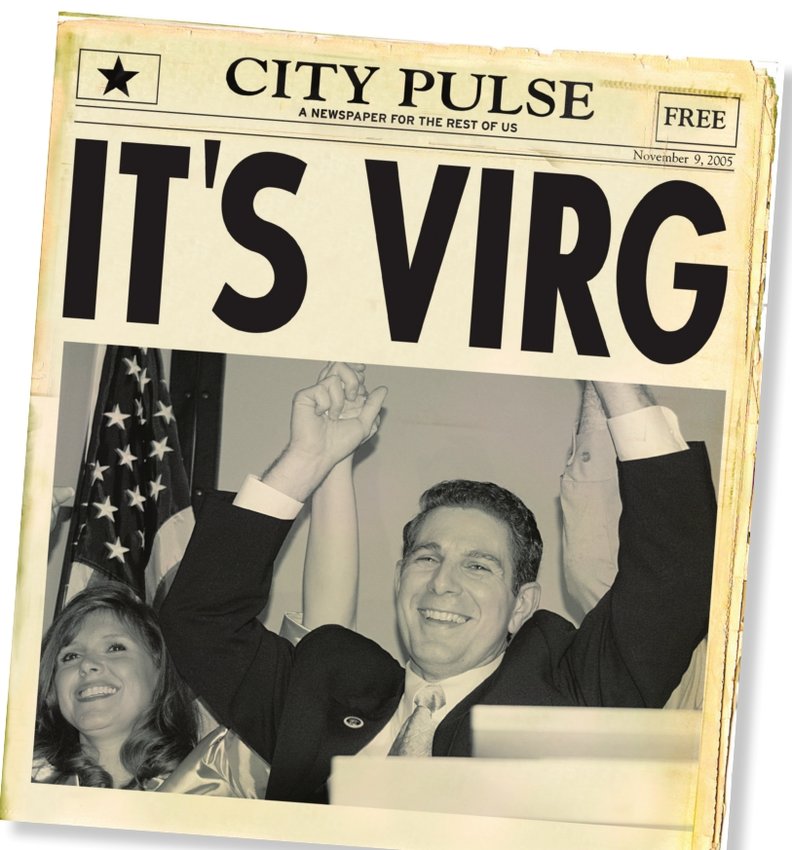
In baseball there is the adage: Better to trade a year too early than a year too late. But politics is about the moment, and in 2016 anger is in. Benero was six years too early, but he echoed what at least some voters want — a brawler.
In Lansing, it's what they get … and apparently what they like.
After 10 years in office, Bernero's popularity exceeds that of politicians everywhere. City Pulse survey of 1,035 voters reveals broad support for his job performance. And even more telling, people in Lansing like him personally, anger and all. (Poll story, P. 12.)
Thirty-nine percent says Benero is doing a good job as mayor of Lansing; just 24 percent rate his performance as poor. In response to this question, “Regardless of the job he has done, how do you feel about him as a person?” Twenty-nine percent of those responding say they like him personally. Most were neutral, and only 21 percent professed to dislike him.
In today's political climate, these sorts of numbers proclaim “Bernero: Mayor for Life.” The approval rate for the U.S. Congress averages about 13.5 percent. The state Legislature has a 20 percent approval rate with 54 percent of voters disapproving, according to Public Policy Polling's July survey. Gov. Rick Snyder in the same PPP poll had a 40 percent approval rating, but a dreadful 47 percent disapproval grade. And that was before the lead poisoning of children in Flint dropped on him and his administration.
The City Pulse poll about Bernero shows consistent favorability ratings in all four city wards. He was a bit more popular with women than with men; 17 percent of women rated his performance as poor compared with 27 percent of men. And even among Republican voters just 34 percent rated his job performance as poor.
Lansing's chattering class — so-called “progressives” — have long bristled at Bernero's style. While they acknowledge that Lansing is moving in the right direction, the mayor is a bit too mouthy, too in your face for their sensibilities. Their feelings about Bernero are somewhat akin to the visceral dislike of conservative Republicans toward President Obama.
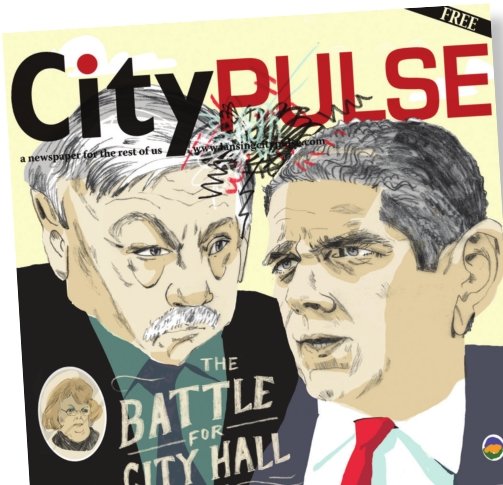
They consider the mayor a bully — in office less than two months, he publicly referred to then Councilman Brian Jeffries as a “pathetic piece of shit”; his angry phone calls to public figures and journalists alike are legendary. Hence their reluctance to talk and recount grievances like the demise of the old Lansing City Market. They pine for a professional city manager or think wistfully about alternative candidates for mayor — term-limited State Rep. Andy Schor or Council’s new president, newcomer Judi Brown Clarke. Schor with a razor thin legislative record is unlikely; Clark is simply unproven.
At-large Councilwoman Carol Wood ran against Bernero for mayor in 2009. She frames her differences with the mayor as one of priorities.
“The importance of continuing to grow Lansing is something both Virg and I agree on. But is it to the detriment of the neighborhoods?” Wood asked.
“What I constantly hear is that our neighborhoods feel that they have been left out a s part of the process and part of the vision. They don't feel valued.” She believes there should be more attention and money for streets, sidewalks and parks, and that developers in the hub if pressed by the city could improve its corridors.
But if the neighborhoods feel neglected, it doesn't show in their feeling about Bernero. The results suggest that his passion and his angry mayor persona conform with how their city should be managed.
“I tell it like it is. You don't have to wonder where you stand and you never have to guess where I stand. A lot of politicians are mealy-mouthed,” Bernero said last week discussing his tenure and the poll results.
“ If you want to argue with me, I'm always open to debate. And I've learned to change my position. But the thing about being mayor is that you can't bullshit people. Basically they are voting on how the city is today and how it is going. When it comes to being mayor, it is what it is. Mayor is the most local of all offices.”
What drives Bernero, and what voters seem to recognize, is a passion to battle for Lansing against real and imagined foes.
“We have to fight every day because the deck is stacked against cities,” Bernero said. “We get screwed on revenue sharing. The state has all of these office building here but in Lansing they don't pay property taxes.”
And don't get him started about Lansing Township and Eastwood Town Centre, the sprawling retail and hotel complex just north of the city that cloaked in a “Downtown Development Agreement” shares only a fraction of its economic bounty with other communities.
Still, Bernero recognizes that for Lansing to succeed, the region must prosper and has long advocated more cooperation on a host of issues. He rejects the suggestion that his at times charged rhetoric has dampened regional efforts and backs this assertion with a litany of successes that are shaping Greater Lansing.
“When I became mayor it was every community for itself. We no longer do that. We've laid down our arms and don't compete against each other.”
He cites 425 development agreements (a way for two local governments to share tax revenue from new business growth) with Alaiedon Township to expand Jackson National Life's headquarters, the expansion of General Motors facilities in Delta Township and the agreement with DeWitt Township to create a new economic development zone at the Capital Region International Airport.
Lansing shares a fire chief with East Lansing. The city and other municipalities are coordinating and funding park and trail improvements, the result of a new countywide millage. In 2006, the city asked Ingham County to assume management and maintenance of the Potter Park Zoo, a change that was approved by voters.
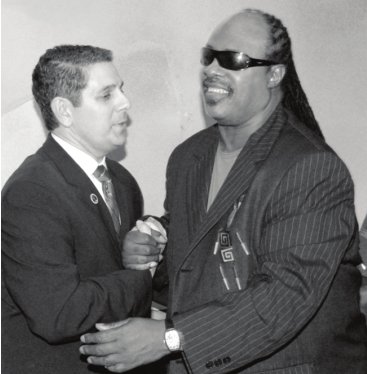
“I went to the Friends of the Zoo and went to the county and said we can't do this any more. We just couldn't keep it up. Now it's a county zoo. If it wasn't, I think it would be closed today. The collaboration was phenomenal, and now the zoo can continue on forever,” Bernero said.
He believes that people in the region may be more open to regional cooperation than the politicians they elect. And this view applies to the city.
“Change is difficult. Look at the heat I took on closing two golf courses. But every time I've asked voters to amend the city charter they've said yes. Every time I 've asked voters to approve the sale of property, they've said yes. Lansing is continuing to right size and the public understands that.”
For a politician with Bernero's populist roots and strong support from unions, he has nonetheless forged a productive relationship with the business community.
It was evident in the most recent City Council election where he aligned with the Greater Lansing Regional Chamber of Commerce to support incumbent A'Lynne Boles and to try to defeat incumbent councilwoman Jody Washington and challenger Adam Hussain.
Both the Chamber and Bernero misjudged the voting public's temperment. Boles lost; Washington and Hussain won. But it illustrates the singular view that Lansing must diversify its economy and that this requires business investment. He was an early supporter of the Lansing Economic Area Partnership whose CEO, Bob Trezise, previously headed the city's economic development corporation.
For businesses planning to invest in the city, the mayor is seen as a strong though demanding ally.
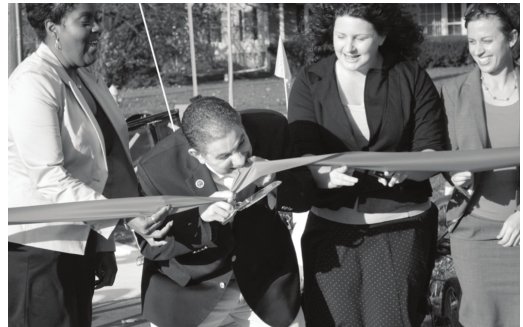
“With Virg you know what you are going to get,” said Pat Gillespie, whose developments included the Midtown, Marketplace and the Stadium District apartment complexes. “If he understands what you want to do and sees betterment for the city, then he'll get behind it. Once he's fully informed, he's all in.”
“We lay out the red carpet rather than the red tape. Lansing had developed a reputation as being too bureaucratic,” Bernero said. “The business community is going to lead the way. Companies like Neogen, Two Men and a Truck and Accident Fund are growing and adding jobs.”
It is the transformation of the abandoned Ottawa Power Station into the Accident Fund Insurance Co. of America's corporate headquarters that Bernero cites as one of the significant accomplishments of his administration.
Some of the biggest projects are in the offing and involve land abandoned by General Motors as part of its restructuring — socalled Racer Trust properties. The trust, which Bernero lobbied for as head of the national Mayors Automotive Coalition is overseeing the sale of four derelict sites in Lansing, Lansing Township and Delta Town ship, properties that Bernero said are primed for redevelopment and jobs.
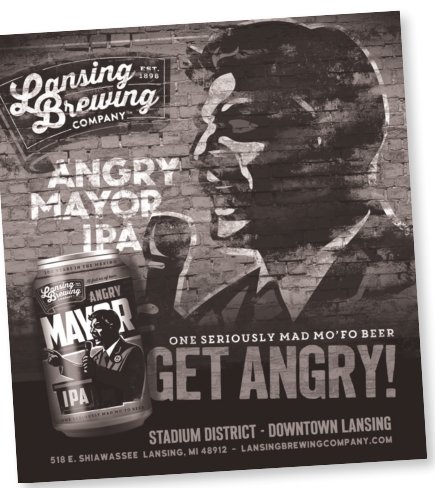
Developers of the Red Cedar Renaissance, a $280 million development on the closed Red Cedar Golf Course, expect to break ground in 2016. And the city and the Sault Tribe of Chippewa Indians are awaiting federal approval to advance their plans for a $245 million casino adjacent to the downtown Lansing Center. It too could happen in 2016.
On a smaller scale, the city boasts of the urban renaissance that is Old Town and the potential to replicate a renewal in REO Town just south of the downtown business district. The beginnings of a revival along Michigan Avenue is underway, spurred by the potential of the Red Cedar project and the $99.5 million SkyVue project already started on the former Story Oldsmobile site.
Bernero expects to see these projects mature during his time as mayor, which is unlikely to end soon. Although he hasn't announced it formally, he said he plans to run for a fourth term.
Bernero said he has about $100,000 in his reelection fund and expects to add another $60,000 after his next fundraiser.
He is supporting Hillary Clinton for president and has good relationships with the national Democratic Party. What about a position with a Clinton administration?
“I'm excited about what it would do for Lansing with a friend in the White House. But I can't imagine living in the Washington area. But, never say never. If they felt I could make a vital difference it would be tempting. When I go there, it will be a labor of love.
Another run for governor? “I really doubt that. I have to consult with my boss” — wife Teri, a public school principal in Lansing.
What Bernero said he needs to focus on is education and jobs training. He wants greater collaboration with city schools and Lansing Community College to ensure that there is opportunity across the city's demographic spectrum.
“My 2016 resolution is to be purposeful, intentional and strategist,” he said. And he added, “to maintain an attitude of gratitude.”
Support City Pulse - Donate Today!
Comments
No comments on this item Please log in to comment by clicking here